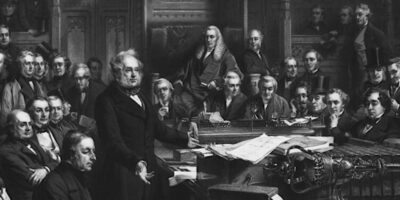Free Trade in Ten Easy Points

Several superb books, monographs, and papers are available to introduce non-economists to the positive economics of trade and to the normative case for a policy of unilateral free trade. And it’s a good thing. Today’s increasing eagerness of people across the ideological spectrum to embrace protectionism must be resisted with all the intellectual strength that can be mustered.
An incomplete, but suggestive, list of these publications includes Frédéric Bastiat’s timeless classic Economic Sophisms, Leland Yeager’s Free Trade: America’s Opportunity, Douglas Irwin’s Free Trade Under Fire, Russ Roberts’s The Choice, Pierre Lemieux’s What’s Wrong with Protectionism?, Daniel Griswold’s Mad About Trade, Paul Krugman’s Pop Internationalism, Veronique de Rugy’s “New Protectionism: Still Protectionism and Bad Economics,” and – I boastfully add – my own “Free Trade and How It Enriches Us.” (A somewhat more advanced work worth mentioning here is Arvind Panagariya’s Free Trade and Prosperity.)
But even the shortest of these works is over twenty pages long. And so I offer below, in bullet-point style and in just over 1,100 words, a primer on the case for unilateral free trade.
1. The purpose of exporting goods and services is to import goods and services.
This reality is often missed because exports are sold for – and imports are bought with – money. But what good is money if it can’t ultimately be used to acquire food, clothing, automobiles, vacations, and other real goods and services?
The reason that you, as an American, might eagerly sell your watch to a European for 100 euros but not be tempted to sell it for 100 billion Monopoly dollars is because euros, unlike Monopoly dollars, can be exchanged for real goods and services. Even if you, personally, wish to buy only from Americans and to buy nothing from Europeans, you know that you can exchange your 100 euros for American dollars – and the reason you can make this exchange is because some holder of American dollars does want to buy at least 100 euros worth of goods and services from Europeans.
You were able profitably to export your watch to Europe only because some American wished to import real goods or services from Europe.
2. Even if we focus exclusively on the effects of trade on the home country, it follows from the above that free trade succeeds economically only insofar as it increases domestic citizens’ access to real goods and services.
And it does indeed do so. The economic success or failure of free trade is not registered in whatever consequences it might have on a country’s trade deficit, on the absolute amount of exports, or on the fate of particular industries. It is measured in its contribution to ordinary people’s living standards.
3. To the extent that tariffs succeed in protecting jobs in some domestic firms, they destroy jobs elsewhere in the domestic economy.
Insofar as tariffs enable some domestic producers to raise the prices they charge – and, thus, prompt these protected firms to produce more output than they would produce absent the tariffs – consumers have less money to spend on other goods and services. Demand for other domestically produced goods and services is artificially lowered by the same tariffs that artificially raise demand for the output of protected firms. While output and employment in protected firms rise, output and employment elsewhere in the domestic economy fall.
Tariffs do not increase total domestic employment over the long run, and nor do tariffs decrease this employment. Tariffs shift employment. Tariffs shift employment away from unprotected industries to protected ones.
4. In the absence of any home-country trade restrictions, workers and other domestic resources would tend to be employed in ways that produce the most value.
This happy outcome is ensured by competition. Workers employed to produce domestically what can be imported at lower costs are workers employed inefficiently. With free trade, these workers would lose their jobs. They would eventually find employment producing outputs that are produced most efficiently in the home country.
5. Tariffs, therefore, by protecting workers employed inefficiently from losing their jobs, cause workers and other resources to be employed less productively than otherwise.
Because over the long run wage rates are determined by worker productivity, protectionism – by keeping workers in less-productive employments – keeps real wages lower than wages would otherwise be.
6. Other countries’ trade restrictions harm mostly residents of those other countries.
“Retaliation” at home with tariffs only imposes similar, pointless harm on home-country residents.
7. If a country runs a trade deficit with the rest of the world, that’s likely a sign of economic health rather than of economic illness for that country.
The reason is that a trade deficit – or, more accurately, a current-account deficit – means that foreigners are investing more in that country than that country’s citizens are investing abroad.
Because no one chooses to invest in economically decrepit places, a steady stream of investment dollars flowing into a country signals that global investors regard that country – at least relative to many other countries – as an especially promising place to entrust their funds. Moreover, this inflow of investment funds strengthens the domestic economy, for it brings into the country more real resources than would otherwise be put to work there.
Why we Americans should be upset that foreigners are so consistently eager to invest on our shores is mysterious, to put it mildly.
8. A trade deficit with the rest of the world does not necessarily mean that citizens of the home country are becoming more indebted to foreigners or are losing net worth to foreigners.
While, say, an increase in America’s trade deficit might mean that Americans are now more indebted to foreigners – as would be true if this increase came about through more purchases by foreigners of U.S. government bonds – America’s trade deficit can increase without causing any increase in Americans’ indebtedness.
If, for example, foreigners buy at the New York Stock Exchange more stock in Apple, Inc., America’s trade deficit rises. The reason is that these dollars are thereby not used to buy American exports. But because shares in a corporation are not debt instruments there is no corresponding increase in Americans’ indebtedness.
And if the American seller of the Apple stock uses the sales proceeds, say, to start or invest in a new company, to fund his or his children’s education, or to buy American real estate, the foreigner’s purchase of that Apple stock, while it does increase America’s trade deficit, does not decrease Americans’ net worth. Claims to the contrary spring from the implicit, but mistaken, assumption that the amount of capital in the world is fixed.
9. In our world of more than two countries, one country’s trade balance with another country – be it in deficit or surplus – is utterly without economic meaning.
Bilateral trade balances are nonsense concepts. The reason is the same for why your trade deficits with your supermarket and favorite airline are economically meaningless. In a world of more than two economic agents – as in a world of more than two countries – there is no reason whatsoever to expect that any two of them will buy from, and sell to, each other the same amounts. Keep this fact in mind when you next encounter some politician or pundit complain about America’s trade deficit with China.
10. Because politicians are especially responsive to the pleas of special-interest groups, tariffs are imposed not in any ‘scientific’ manner meant to ‘grow’ the economy.
Instead, tariffs are imposed to further the electoral prospects of politicians by artificially swelling the revenues of those domestic producers that most successfully lobby politicians.
There is much more to be said in favor of a policy of unilateral free trade. But the case against the plunder that is protectionism can be usefully summarized in a short space – as I hope I have made a respectable start above at doing so.










